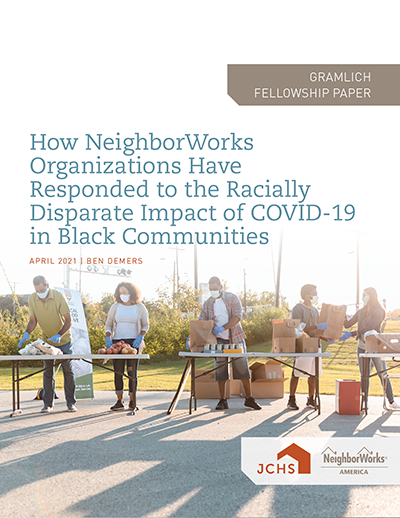How NeighborWorks Organizations Have Responded to the Racially Disparate Impact of COVID-19 in Black Communities
Black American communities have faced many disparate negative impacts of the COVID-19 pandemic, including higher rates of infection and pandemic-induced job loss. Given the history of community development organizations in responding to spatial and economic racial inequities, the role of these organizations in responding to the pandemic, and the greater attention given to anti-Black racism in the wake of the murder of George Floyd in May 2020, this paper seeks to document and examine how organizations within the NeighborWorks® America network are responding to the disparate racial impacts of the pandemic. To do so, it poses two central questions: How are community development organizations that are based in predominantly Black communities pursuing racial equity in their response to the COVID-19 pandemic? And how has the confluence of national conversations around racism and police brutality along with the pandemic allowed organizations to advocate for a more racially equitable recovery moving forward?
To answer these questions, the author conducted twenty-six interviews with staff at NeighborWorks® America, the National NeighborWorks® Association, and four NeighborWorks® America network organizations that served as my case studies: Neighborhood Housing Solutions of Los Angeles County, in Los Angeles County, CA; Beyond Housing, in the Normandy School Collaborative, MO; Urban Edge, in Boston, MA; and Hope Enterprise Corporation, working in five states of the deep South. He finds that these organizations have indeed played a key role in responding to the pandemic’s disparate racial impacts. To do so, they have conducted pointed outreach to learn the needs of Black communities, filled the gaps left by race-neutral federal aid policies, leveraged partnerships when they themselves are unable to completely fill the gap, and learned from the disparate impacts of past crises like the 2008 financial crisis in order to shape their responses. For many organizations, addressing racial equity concerns has also meant continuing work they were already doing, such as homebuyer education classes that reach large proportions of Black homeowners, many of whom are now more concerned about making mortgage payments. Following the murder of George Floyd, however, many organizations have also found that the confluence of the pandemic with protests against police brutality have allowed them to be more vocal about the racial implications of their work and to advocate for more resources.

